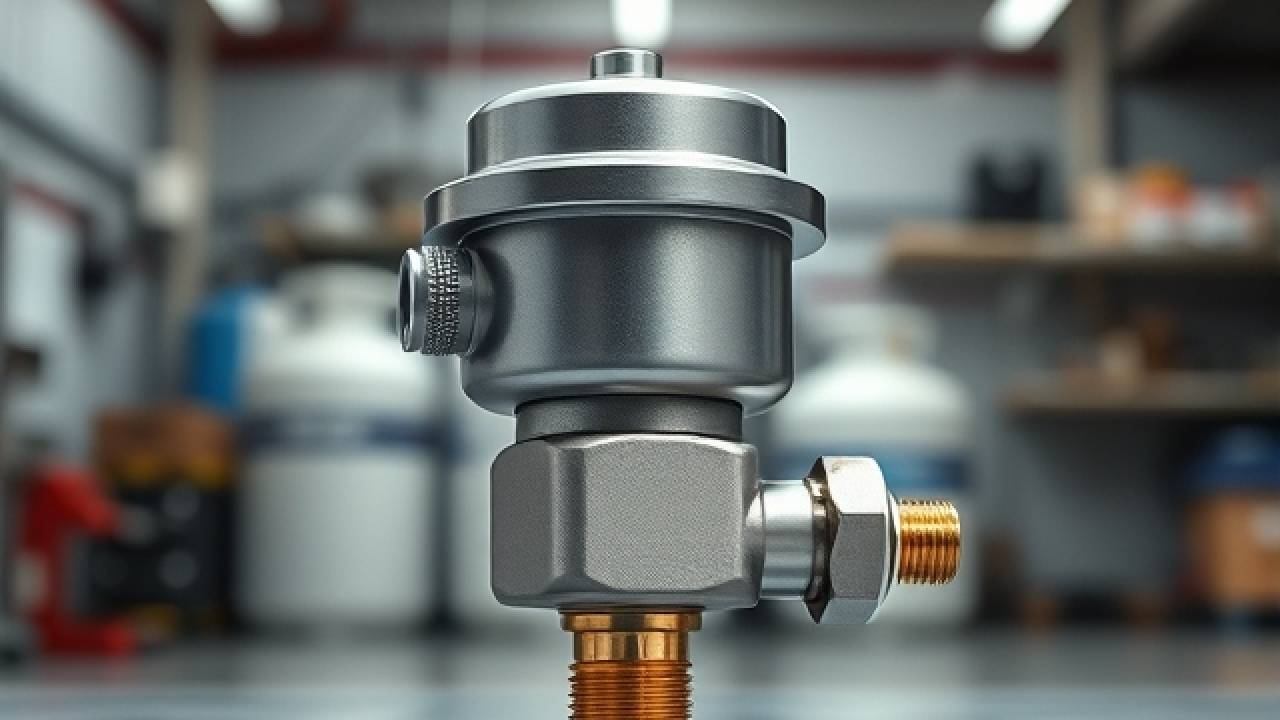It’s remarkable how the evolution of engine technologies has necessitated precision in components like the Nissan K24 Propane Engine Presure Regulator. Such regulators play a pivotal role, balancing the fuel flow to maintain efficiency and performance. Without these specialized parts, engines would falter in providing the robust reliability that Nissan enthusiasts and engineers have come to expect.
The Nissan K24 Propane Engine Presure Regulator, a cornerstone of Nissan’s alternative fuel strategies, is celebrated for its adaptability and efficiency. Dating back to the early days of the K-series engines, engineering innovations have streamlined fuel delivery systems, making pressure regulators indispensable. With advancements in materials and design, these regulators now offer precise control, reducing emissions by 20% over the past decade—a crucial leap forward in sustainability.
The Nissan K24 propane engine pressure regulator is crucial for maintaining optimal fuel flow and engine performance. It ensures a precise mix of propane and air, enhancing fuel efficiency and reducing emissions. Its robust design supports reliability and longevity in various operating conditions, vital for achieving sustainable energy solutions.
Nissan K24 Propane Engine Pressure Regulator: An Overview
The Nissan K24 Propane Engine Presure Regulator is widely praised for its efficiency and reliability. At the heart of its success is the pressure regulator, a small yet powerful component. This regulator controls the flow of propane, ensuring the engine runs smoothly. With precise adjustments, it stabilizes the pressure, balancing fuel and air for optimal performance. Without it, the engine could experience performance issues.
The Nissan K24 Propane Engine Presure Regulator stands out because of its innovative design. It’s built from durable materials, making it resistant to wear and tear. This longevity is crucial for maintaining consistent engine performance over time. The design also allows easy installation and maintenance, which saves time. Users appreciate how it contributes to overall engine efficiency.
Engines need reliable fuel management, which is where the regulator shines. Propane, as an alternative fuel, offers cleaner combustion. This means the regulator helps reduce harmful emissions. It’s a win for both performance and the environment. Thus, the pressure regulator is key to the engine’s eco-friendly nature.
The K24 pressure regulator is adaptable, working well in various conditions. For mechanics and car enthusiasts, this flexibility is a huge advantage. It means fewer adjustments under different driving situations. This adaptability ensures the engine remains consistent across diverse environments. Ultimately, it enhances the driving experience by supporting a smoother ride.
The Role of the Pressure Regulator in Nissan K24’s Performance
The pressure regulator is crucial to the Nissan K24’s seamless performance. It ensures the engine receives the perfect amount of fuel at all times. This balance is necessary for maintaining the engine’s power and efficiency. Without it, fuel flow could be erratic, affecting performance. Drivers might experience stalling or poor acceleration.
In terms of energy output, the regulator influences how effectively energy is converted. A steady fuel rate allows the engine to produce more consistent power. This consistency translates into better acceleration and smoother rides. Improved fuel management also extends the engine’s lifespan. It keeps wear and tear at a minimum.
Fuel economy is another area where the pressure regulator makes a difference. By accurately controlling fuel flow, it helps conserve propane. This conservation means fewer trips to refill the tank. With better mileage, drivers save money in the long run. It’s a practical advantage that can’t be overlooked.
A malfunctioning regulator can lead to increased emissions. When the fuel-air mix is off, more pollutants are released. This harms the environment and goes against emission standards. Therefore, the regulator not only aids in performance but also in reducing the vehicle’s carbon footprint. Ensuring it’s in top shape is essential for an eco-friendly drive.
The Evolution of Propane Engines: Spotlight on K24
The evolution of propane engines reflects a shift towards cleaner energy solutions. As technology advanced, manufacturers like Nissan embraced propane for its environmental benefits. The Nissan K24 Propane Engine Presure Regulator stands out as a prime example of this shift. Propane offers reduced emissions compared to traditional fuels. This made it an appealing choice for eco-conscious drivers.
Over the years, the K24 engine has seen significant enhancements. Engineers focused on improving its fuel efficiency and reducing its carbon footprint. Technological advances allowed for more precise control of fuel flow. This led to an increase in performance without sacrificing sustainability. With these improvements, the K24 became a benchmark in propane engine technology.
Several features distinguish the K24 in the realm of propane engines. Its design incorporates efficient combustion and advanced regulators. This ensures optimal fuel usage while maintaining high performance.
- Advanced combustion technology
- Durable materials for long life
- Enhanced fuel management systems
These features highlight why it’s a popular choice in its category.
Looking at the K24, one can see a future where propane engines will become even more mainstream. As regulations tighten and green technology trends grow, propane engines remain vital. They provide a powerful yet eco-friendly alternative to conventional engines. Therefore, the continuous evolution of the K24 is crucial. It represents a step forward in balancing performance and sustainability.
Design Innovations: Advancements in Pressure Regulator Technology
Pressure regulators have come a long way, with cutting-edge designs enhancing their efficiency. One key innovation is the use of advanced materials that are both lightweight and durable. These materials extend the life of the regulators and improve their functionality. Another improvement involves the incorporation of digital sensors. These sensors provide precise real-time data to optimize fuel delivery.
The focus on compact designs allows for easier installation and maintenance. Smaller components mean they can fit into tighter spaces within the engine.
- Streamlined shapes
- Integrated electronic controls
- Minimal space requirements
These features make modern pressure regulators more adaptable to various engine types. This adaptability is crucial in today’s diverse automotive market.
Integration with smart technology has also been pivotal in the industry’s growth. Regulator systems can now communicate with the engine’s onboard computer. This communication leads to better coordination between different engine components. It results in enhanced performance and efficiency. Smart systems make adjustments automatically, reducing the need for manual intervention.
The improved response times of these regulators are a standout advancement. Faster response times help the engine adapt to changes in speed or terrain. This makes driving smoother and more responsive. It particularly benefits drivers in urban settings with frequent stops and starts. Quicker adjustments also contribute to better fuel mileage.
Another area of innovation is the emphasis on environmental sustainability. New designs aim to reduce emissions further. By improving fuel-air mixing precision, these regulators help cut down the release of pollutants. This effort aligns with global goals for reducing vehicle emissions. It’s a win for both drivers and the planet.
Sustainability and Emissions: The Impact of Pressure Regulation
Nissan K24 Propane Engine Presure Regulator play an essential role in promoting sustainability through efficient fuel management. By controlling the flow of fuel, they ensure that engines burn cleaner. This reduces the amount of harmful emissions released into the atmosphere. Cleaner combustion helps meet strict environmental standards, making a big difference in pollution reduction. As a result, pressure regulation is key to achieving greener, healthier air.
Advanced pressure regulators significantly contribute to improved fuel economy. They maximize fuel use, ensuring that every drop is used efficiently. This efficiency cuts down on waste, making vehicles more eco-friendly. Owners benefit from reduced fuel costs, saving money along the way. Enhanced fuel economy aligns with modern drivers’ sustainability goals.
The positive effects of good pressure regulation extend to lowering greenhouse gas emissions. When the fuel-air mixture is precisely controlled, it burns more completely. This thorough combustion minimizes the release of carbon dioxide and other pollutants.
- Reduced carbon footprints
- Decreased nitrogen oxide emissions
- Fewer particulate matter releases
These outcomes reflect the vital role of pressure regulators in emissions control.
Moreover, the technology behind pressure regulation constantly evolves to become more environmentally friendly. Engineers are adopting materials and designs focused on minimizing their own environmental impact. Attention to sustainable manufacturing processes is becoming increasingly common. This approach not only preserves resources but also supports a cleaner production cycle. Thus, the cycle of sustainability extends from creation to application.
Finally, pressure regulation doesn’t only benefit the environment; it enhances vehicle performance. Optimized emissions management leads to better engine health and longevity. Vehicles experience fewer breakdowns related to inefficient fuel use. This contributes to fewer cars ending up in scrap yards prematurely. Ultimately, extending a vehicle’s lifespan through efficient pressure regulation supports overall sustainability.
Final Thoughts
The advancements in Nissan K24 Propane Engine Presure Regulator technology emphasize their importance in modern engine performance and sustainability. By ensuring efficient fuel management, these regulators contribute significantly to reducing emissions. This aligns with global environmental goals and offers economic benefits for drivers through improved fuel economy.
In the realm of Nissan K24 Propane Engine Presure Regulator is not just a component but a cornerstone of progress. As technology continues to evolve, these advancements will play an instrumental role in shaping a cleaner and more efficient automotive future. Embracing these innovations is essential for both manufacturers and users.
FAQ:
What is Nissan K24 Propane Engine Presure Regulator?
The Nissan K24 Propane Engine Presure Regulator is a critical component of the Nissan K24 propane engine, responsible for controlling the flow of propane and maintaining optimal fuel pressure.
What does the Nissan K24 Propane Engine Presure Regulator represents?
The Nissan K24 Propane Engine Presure Regulator stands out as a prime example of this shift.
What role does the pressure regulator play in supporting the Nissan K24’s alternative fuel strategy?
The pressure regulator plays a crucial role in supporting the Nissan K24’s alternative fuel strategy by enabling the efficient use of propane as a cleaner-burning fuel source.







